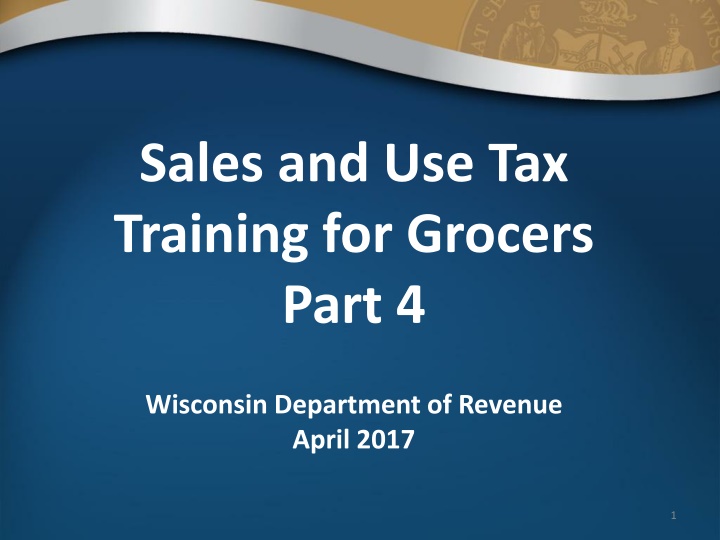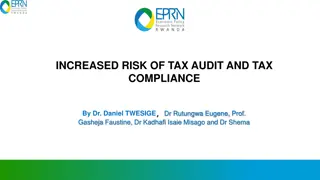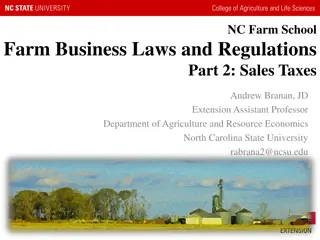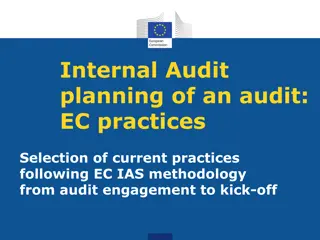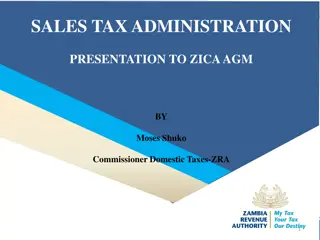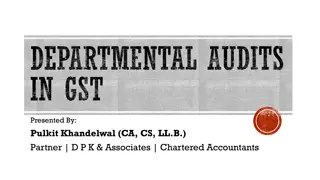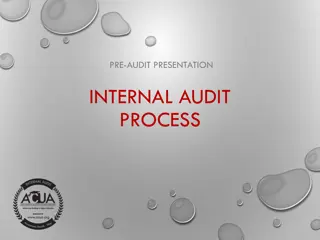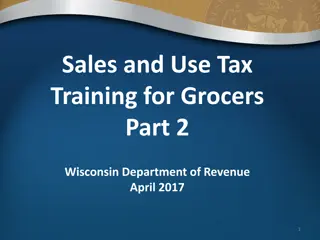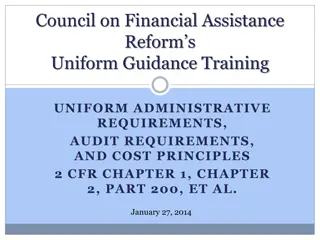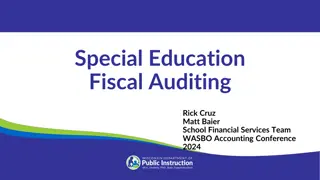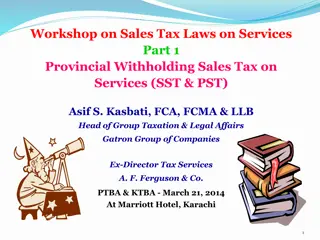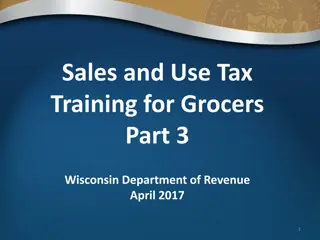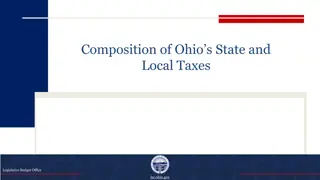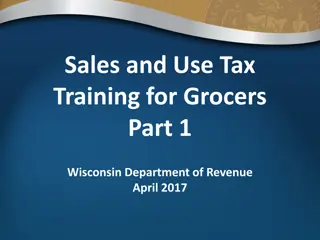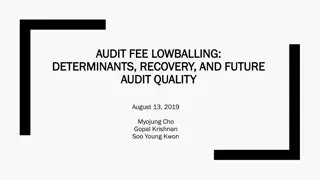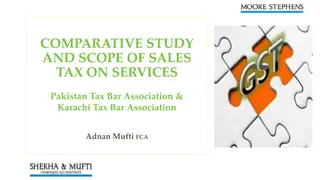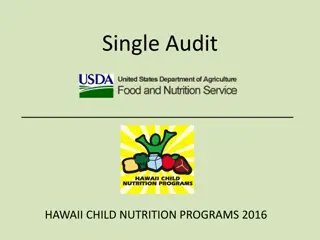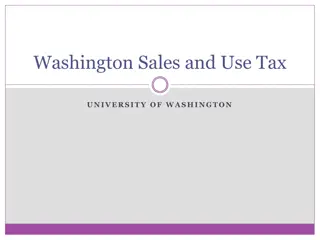Wisconsin Sales and Use Tax Training for Grocers - Audit Preparation and Record Keeping
This resource provides guidance on preparing for a sales tax audit as a grocer in Wisconsin. It covers important topics such as record-keeping requirements, taxable and exempt products, and necessary documentation. Maintaining detailed records, including sales tax returns, invoices, and exemption certificates, is crucial for compliance with state tax laws.
Download Presentation

Please find below an Image/Link to download the presentation.
The content on the website is provided AS IS for your information and personal use only. It may not be sold, licensed, or shared on other websites without obtaining consent from the author.If you encounter any issues during the download, it is possible that the publisher has removed the file from their server.
You are allowed to download the files provided on this website for personal or commercial use, subject to the condition that they are used lawfully. All files are the property of their respective owners.
The content on the website is provided AS IS for your information and personal use only. It may not be sold, licensed, or shared on other websites without obtaining consent from the author.
E N D
Presentation Transcript
Sales and Use Tax Training for Grocers Part 4 Wisconsin Department of Revenue April 2017 1
Topics of Discussion Preparing for an Audit Field Audit Process 2
Additional Training for Grocers Part 1 Sales by Grocers Part 2 - Sales of Candy, Soft Drinks, and Dietary Supplements Part 3 Sales of Prepared Foods 3
Preparing for an Audit All sales, licenses, leases, and rentals of tangible personal property are subject to Wisconsin sales tax, unless an exemption applies. Grocers sell a variety of taxable and nontaxable products. A grocer has the burden of proving that a sale is not subject to tax. It is essential to maintain a good record keeping system. 4
Record Keeping Retain records for all years open to audit (generally 4 years). At a minimum this would include: Sales tax returns (ST-12) and the supporting documentation and backup detail used to complete the returns. Exemption certificates Records to support tax determinations of food items 5
Record Keeping At a minimum this would include (cont.): Fixed asset records Sales and purchase invoices Depreciation schedules General purchase Invoices General ledger/journal entries Chart of accounts 6
Record Keeping Exempt Food Products Records must be kept to determine taxability of food products. If a food product is exempt, there is no need to obtain and keep an exemption certificate to support the exempt sale. 7
Record Keeping Exempt Food Products Documentation to help support an exempt food product include the following: UPC or SKU, product description product label tax treatment assigned to the product in your sales system Changes made to add/remove a product or changes to the tax treatment (i.e., historical data) should also be maintained. 8
Record Keeping Exempt Products Exemption certificates are NOT needed for the following exempt products: Food and food ingredients Prescription drugs Durable medical equipment Mobility-enhancing equipment Prosthetic devices Motor fuel Newspapers United States and Wisconsin flags See sec. Tax 11.14(16) for a full list of exempt sales which do not require an exemption certificate 9
Record Keeping Exempt Purchaser Federal and Wisconsin governmental units Claimed by submitting any of the following to the grocer: Exemption certificate Certificate of Exempt Status (CES) number issued by DOR Purchase order Organizations organized and operated exclusively for religious, charitable, scientific, educational, or prevention of cruelty to children or animals (generally exempt under sec. 501(c)(3) of the Internal Revenue Code) MUST provide its CES number to the grocer (except for out-of- state organizations) 10
Record Keeping Exempt Use Exemption certificates are needed when a purchaser indicates they will use the product in an exempt manner, such as sales for resale An exemption certificate is valid if it is received within 90 days of the sale and is fully completed by containing the following: Purchaser's name and address Purchaser's type of business Reason for exemption Seller's permit number or CES number, if applicable Signature of purchaser 11
Don't Forget Use Tax! Use tax is the most common audit adjustment Review all purchase invoices to ensure tax has been properly paid on all taxable products and services (other than inventory resold). Pay special attention to: Out-of-state vendors Vendors that you have provided an exemption certificate Keep detailed records and copies of invoices for all use tax remitted. 12
Don't Forget Use Tax! Examples of common use tax situations Equipment (coolers, shelves, cash registers, shopping carts) Cleaning supplies and other items removed from inventory for store use Office equipment and supplies 13
Don't Forget Use Tax! Examples of common use tax situations (cont.) Credit card or p-card purchases Landscaping services (see Publication 210) Brochures, flyers, promotional giveaways (see Publication 235) 14
Initial Audit Contact Audit setup letter sent to the taxpayer which identifies: Auditor Audit start date Audit location Audit tax type and audit period Initial audit set up letter also requests the taxpayer to call the auditor within 5 days of receiving the letter 16
Initial Audit Contact Telephone call with auditor Confirm date, time, and location of the audit Ask auditor questions Discuss business and records 17
Initial Audit Contact How long will the audit take? Varies depending on records and audit issues Missing records Availability of records (e.g., electronic vs. paper, condition, organization, location) Volume of records Number of questionable items, consistency of records Whether 3rd party contacts are needed to obtain additional information 18
Initial Audit Contact Audit Confirmation Letter Confirms the date, time, and location Provides a list of records requested Publication 501, Field Audit of Wisconsin Tax Returns Publication 114, Your Wisconsin Taxpayer Bill of Rights 19
Initial Field Work & Records Review Initial discussion to gather any information that was not provided during the initial phone call that will aid in the understanding of the business and records process Walk-through of the records that are provided Explain the audit process, including information about submitting any Claims for Refund Auditor will start reviewing the records 1 day to 2 weeks or more 20
Initial Field Work & Records Review Records initially requested Sales Tax Returns (ST-12) and supporting detail Listing of UPC or SKU items with taxability Exemption certificates Sales of fixed assets Purchase invoices Fixed asset purchase invoices 21
Initial Field Work & Records Review May request additional records or information and provide a response time for providing them Preliminary audit schedules Provided after the initial field work Identifies questionable transactions Additional records or information needed to resolve questions Identify vendors and customers to contact 22
What Do You Need To Do? Have records ready Discuss records (quantity, format, filing method) Provide records electronically whenever possible Discuss reports that could be generated to streamline the audit Work with the auditor Respond to requests in a timely fashion Suggest more efficient ways to provide data (if possible) Ask questions when you don't understand policy or procedure 23
What Do You Need To Do? Review records and identify possible Claims for Refund EARLY in the audit Make 3rd party contacts as soon as possible (if necessary) 24
Completion of the Audit Final Conference Notice of Proposed Audit Report is presented and explained Provides the additional tax or refund, estimated interest, and penalties (if applicable) Resolve any outstanding issues/disagreements Auditor's supervisor may need to be involved 25
Completion of the Audit Notice of Proposed Audit Report 30 days to review the proposed audit report and provide any final documentation or information Indicate if you agree or disagree with the audit adjustments Provides instructions for prepay option (if fully agreed) 26
Completion of the Audit Auditor completes the audit report and submits for final review and processing Report is reviewed for accuracy and completeness Once finalized, the Notice of Field Audit Action letter is sent to the taxpayer/taxpayer's representative with Notice of Amount Due or Refund 27
Audit Resources Publication 114: Your Wisconsin Taxpayer Bill of Rights Publication 501: Field Audit of Wisconsin Tax Returns Publication 506: Taxpayers' Appeal Rights of Field Audit Adjustments Publication 515: Non-Statistical Sampling Publication 516: Statistical Sampling 28
Additional Training for Grocers Part 1 Sales by Grocers Part 2 - Sales of Candy, Soft Drinks, and Dietary Supplements Part 3 Sales of Prepared Foods 29
Contact DOR if you have questions WISCONSIN DEPARTMENT OF REVENUE Customer Service Bureau PO Box 8949, MS 5-77 Madison, WI 53708-8949 Phone: (608) 266-2776 Email: DORSalesandUse@wisconsin.gov 30
